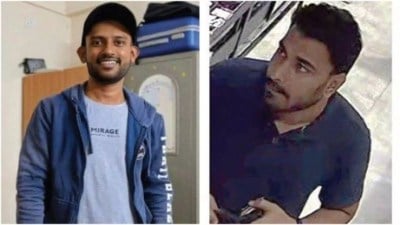- India
- International
Murder that killed a rural idyll
A chargesheet will be filed next week in the double murder case of a senior citizen couple in Dahanu.
 The bungalow where the couple stayed; the spot where Nargis Irani’s body was found. (inset)
The bungalow where the couple stayed; the spot where Nargis Irani’s body was found. (inset)
Well over two months since Naushir (80) and Nargis Irani (70) were killed in their farmhouse here, Kotim village near Vangaon in Dahanu, 150 km from Mumbai, is still wary.
In the quaint village, walking on a rocky narrow path just off the cemented main road, vast chikoo plantations on either side, the overgrown trees on either side lend the setting an eeriness that blends well with the mood of its people. Up this path, beyond a solid iron gate, outside a sea-green bungalow surrounded by a thick carpet of dried leaves from the chikoo trees is a candle in a ‘cutting chai’ glass, a few now dried flowers scattered around. It’s a tribute to Nargis, whose body was found at this spot.
On the morning of December 13 last year, the 30-strong Irani community in the village of 3,000 were jolted when news spread of the murder. The ageing couple, known to be introverted but well-meaning to a fault, had just been found in a bloody crime scene at the farmhouse. Days later, Ravi Thakur, son of a former caretaker of the Irani’ was be arrested.
[related-post]
The chargesheet in the case will be filed next week while Ravi Thakur, earlier lodged in the Palghar lockup, is now in Thane Jail. But even weeks later, the chikoo plantation owners of Kotim have to admit that their rural idyll has changed forever.
“Aunty met me at 6 pm the evening before the bodies were found, outside the lane to their house, she had just returned from her walk,” remembers Prakash Shah, who lives just 200 metres away from the Irani’ house. “She asked me to leave Tommy outside, she suspected somebody had knocked on their door the previous night,” adds Shah, owner of a chikoo and lily orchard. But Shah had to keep Tommy locked — his female dog was in heat and Shah did not want Tommy around her.

Tommy, a cross between a Doberman and a Labrador, is Shah’s idea of security. Many of the plantation owners trust their canines more than they trust the local police. “Tommy is so ferocious that he pounces on any stranger who emerges from his vehicle outside the wadi (orchard).”
The Shahs would often communicate with the Irani by simply shouting across the dense chikoo plantation, but that night the Shahs were just busy.
Eventually, Shah heard of the killing only at 7.30 am the following morning when the police and the couple’s son-in-law arrived. The Shahs also saw Surekha Pardhi, the Irani’ domestic help, running out of the bungalow, but had not thought much of it.
Pardhi, who worked for the Irani couple for more than 20 years, had entered from the back gate that morning and had been calling out to “uncle”. She’d crossed the godown where the couple stored their plucked chikoos and family silverware. “I called out to uncle from the kitchen window. He did not answer. I circled around the house and came till the front porch and saw aunty in a pool of blood in the yard. I couldn’t think after that,” says Pardhi. She ran to her home and got her son to call Rustom, the Irani’ son-in-law.
First a police team and later Tardeo-resident Rustom arrived. Naushir’s lifeless body was at the kitchen dining table with head injuries. Nargis’s throat had been slit.
Mehrnosh Irani, 37, a relative who lives nearby, says his mother and Nargis would meet daily. “Aunty would walk around the farm everyday before retiring for the day to cook dinner for uncle,” Mehrnosh says. He and his mother lived five minutes away.
Ruengiz, Mehrnosh’s mother says Nargis had told her that evening that someone had played a practical joke the previous night, cutting off electricity to the bungalow from the pump room. “Nargis said they had the inverter and had called the electrician to fix it,” says Ruengiz, adding that the introverted couple spoke little about their family.
A dog squad came, but picked up no scents.
The bodies were taken to Boisar Hospital for a postmortem after the forensic and police teams finished their work at the site. A half glass of whiskey was found near Naushir’s body, leading police to believe that the killer may have been invited in as a guest, for there was no forced entry, says Police Inspector Ashok Honmane, investigating officer with the Crime Branch (Thane).
Irani families settled in Dahanu as early as the 1860s, when the first railway line arrived there. They started chikoo farming in Golvad, Dahanu and Boisar, the original landowners picking up a share of the profits. Until as recently as 2000, there were about 300 Irani families in the region, almost all in the chikoo business. With the turn of the century, third and fourth generations are disinterested in farming and have begun to migrate, alongside a coincidental drop in yield from the farms. “Now only 15 per cent of the original population is left here. There’s a road called Irani Road, but there are virtually no Irani there. My generation will be the last of the lot,” says one ageing Irani plantation owner.
With industrialisation and development, areas that were once farm land are now the crowded market areas near the railway station. From 1,000 12-kg baskets per acre, chikoo yield is down to 200 or 300 baskets per acre, a fact blamed on pollution and climate change.
There is also labour trouble. While the local tribal population has increased tenfold, the tribals don’t want to work on the farms any more — the many MIDCs in Boisar, Umargaon, Palghar offer jobs at much better pay and everyday, private buses pick up adivasis for unskilled jobs in factories. “Earlier, it was like a family. We’d provide money for their weddings, they would repay by working for us, all that has changed,” the plantation owner says. “The last remaining farm hands will also most likely retire with us.”
Naushir was from Kalyan, where his family ran a bakery. He married Nargis four decades ago and settled in the Vangaon farmhouse, a gift from her parents.
Initial police theories included the possibility that the murderers arrived when Naushir was alone at home, and that Nargis could have walked into the house moments later and rushed out into the compound to save herself, where she was killed. For blood stains had been found at three spots between the house and the tree where her body was found.
Her earrings were gone — in fact her ears had been slashed. Her gold chain was missing too, though her gold bangles were intact.
Four cabinets in the bungalow were broken open and ransacked. The locker with cash and jewellery was open, though it was unclear what had been taken. Everything else in the house was intact.
The Irani’ son Adil (43) is a cardiac surgeon in California, and had only flown back a few days before the killing after a visit. The couple themselves had lived in the US for 10 months where Naushir underwent two surgeries, returning only in October. They didn’t keep much cash at home. “My father-in-law withdrew money just before salary day to pay the farm hands,” says Rustom.
Some locals said they had spotted Ravi Thakur, the son of the Irani’ former caretaker, in the area a day before the murders. But they had last seen the boy years ago, and nobody was very sure. Over a decade ago, the boy would bunk school and hang out in the farms, robbing fruit and sometimes money. Nabbed once while stealing, the boy was packed off to his village. The caretaker himself returned to his native village some years ago, unable to work due to old age and later passing away four years back. According to the police, Ravi had returned with the intention to rob.
According to Muhammad Haq, superintendent of police (Palghar), Ravi had not kept in touch with the Irani since his father’s death. Having lived in Surat for many years under an assumed name, Ravi had taken a loan of a few lakhs from various people. Harassed by creditors, he struck upon the idea of robbing the Irani who lived alone in their farmhouse and who he remembered from his teenage years.
During interrogation, Ravi reportedly said he had spent nearly two days in Vangaon before the murders, hiding in the farm and on the Irani’ terrace. he had kept a watch on their daily schedule. He’d even robbed a pillow from the porch to get comfortable on the terrace.
The night before the murder, he had entered the meter-room and cut some wires, forgetting that the couple had an inverter.
On Monday, December 12, Ravi hid in the garden behind a chikoo tree and saw Nargis retuning from her walk. He waited as she chatted with a neighbour. As soon as she entered the gate, he pounced on her and slit her throat with a knife. He was walking away when the injured
Nargis caught his foot and dragged herself along for 15 metres, trying in vain to stop him from entering the house.
He shook her off, stopped to slash at her ears for the earrings, then entered the house and saw Naushir in the kitchen, eating. He whipped out a hammer and clobbered him to death. Naushir gave up without a fight.
Ravi reportedly then waited patiently for dawn, consuming some alcohol and watching television in the meantime, until a train for Surat would leave from Dahanu station.
He had robbed some cash and the couples’ mobile phones, but apparently did not know that the mobile phones would reveal his location.
“Nargis used a phone suited for senior citizens. Thakur had switched on the phone a few days after the incident, through which we traced him and arrested him from Surat,” said Haq.
megha.sood@expressindia.com
Apr 18: Latest News
- 01
- 02
- 03
- 04
- 05






































